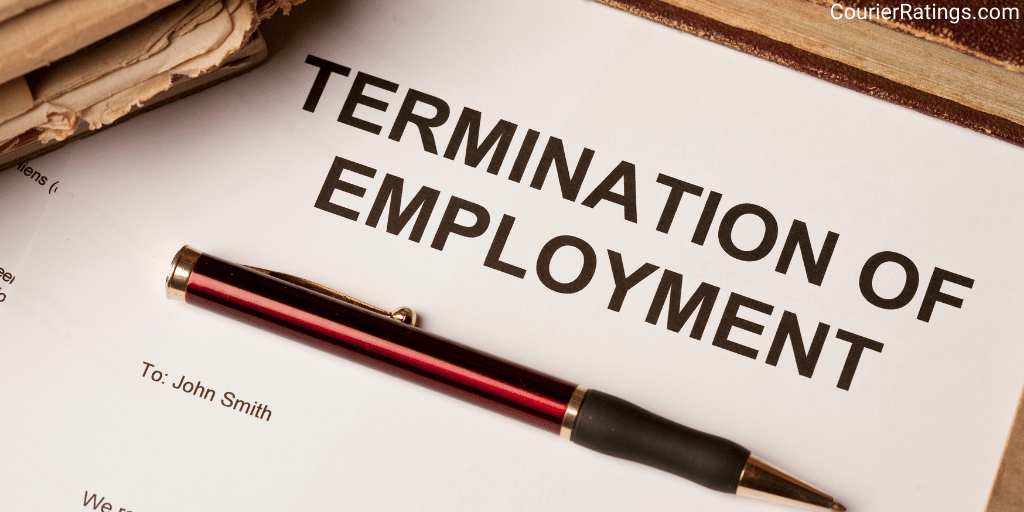FedEx rolls out a new way to end jobs that focuses on being fair and keeping solid paperwork. Following the ‘at-will’ hiring rule means someone can get let go for breaking rules, not doing their job well, or missing work too much. This matters most to workers and managers looking for clear, honest guidelines that avoid surprises. Knowing this can help spot warning signs before things go sideways and keep the work world smoother than a well-oiled machine. Keep reading to find out how this shift could change the way people handle job endings.
The updated discipline policy begins with verbal counseling and escalates to written warnings. Severe misconduct can lead to immediate termination, while accumulating write-ups typically results in dismissal.
Executive officers receive limited severance, and rehire eligibility depends on the termination’s specifics. These changes create a structured framework, impacting both employees and managers significantly.
Key Takeaways
- FedEx follows ‘at-will’ employment, which means you can be terminated without notice for any lawful reason.
- The progressive discipline policy aims for fairness, starting with verbal counseling and moving to written warnings before termination.
- Severe misconduct, such as harassment, theft, or workplace violence, leads to immediate termination.
- Missing work without notifying the company, termed as ‘no call, no show,’ results in instant termination due to a strict attendance policy.

What Is FedEx Termination Policy?
FedEx’s termination policy follows the principle of ‘at-will’ employment, meaning either the employer or the employee can end the employment relationship at any time, with or without cause or notice. This approach provides flexibility for both parties in a dynamic workforce environment.
FedEx employs a progressive discipline policy to manage terminations, focusing on corrective measures before considering termination. This policy ensures employees have opportunities to improve their performance or behavior.
The progressive discipline steps include issuing a warning letter, which remains on an employee’s record for one year, and a performance reminder, which stays for six months. An employee who accumulates three disciplinary actions within a year may face termination. This structured approach highlights FedEx’s commitment to fairness and due process.
When termination becomes necessary, FedEx follows a thorough process. This includes adjusting vacation balance payouts, documenting reasons for termination in the HR system, and determining rehire eligibility.
Why Does FedEx Fire People?
FedEx fires employees for various reasons, from policy violations to performance and attendance issues. The termination policy ensures a structured and fair approach. Key factors include excessive absences, tardiness, and ‘no call, no shows,’ which can disrupt operations. Poor job performance is also closely monitored.
FedEx uses a progressive discipline process for most issues, usually involving warnings and write-ups before termination. Accumulating three disciplinary actions within a 12-month period often leads to dismissal. Severe misconduct, such as theft, falsifying timecards, positive drug tests, and violence, can result in immediate termination.
Layoffs and restructuring also contribute to terminations. Economic pressures or strategic realignments can lead to position eliminations. For example, in 2023, FedEx laid off 10% of its officers and directors as part of restructuring efforts. Though employment is ‘at-will,’ FedEx’s policies ensure clarity and fairness in the termination process.
What Is the Process for Terminating an Employee at FedEx?

The process for terminating an employee at FedEx involves structured steps to ensure fairness and transparency. While FedEx operates under an at-will employment framework, which allows for termination with or without cause, the company generally follows a progressive discipline policy to ensure disciplinary actions are just and well-documented.
Initially, the process starts with verbal counseling to address the issue, which is then recorded in the employee’s file. If further infractions occur, a written warning is issued, detailing the incident and outlining expectations for improvement.
A subsequent warning may include an improvement plan, prompting the employee to rectify their performance or behavior. Persistent issues or severe misconduct can lead to termination without all intermediate steps.
Reasons for termination can include violations of the Code of Conduct, poor performance, attendance problems, and physical altercations.
Administrative steps in the termination process involve reviewing the employee’s vacation balance payout, updating HR systems with termination details, and ensuring the accuracy of final paycheck calculations.
How Many Write-Ups Before Termination at FedEx?
The number of write-ups before termination at FedEx isn’t fixed and depends on various factors. Typically, FedEx follows a progressive discipline policy, starting with verbal counseling, moving to written warnings, and potentially leading to termination.
The specifics can vary based on the severity of the offense, the FedEx operating company, and the discretion of individual managers.
For minor infractions, employees might receive multiple warnings. Severe misconduct, however, can result in immediate termination. Generally, employees may face termination after three to four write-ups within a 12-month period.
FedEx operates under an at-will employment policy, meaning the company can terminate employees with or without cause at any time. Despite this, FedEx often adheres to its progressive discipline policy, focusing on corrective measures before considering termination.
This approach underscores the importance of context, severity, and managerial discretion in the termination process at FedEx.
How Important is Attendance at FEDEX?
Attendance is crucial at FedEx, impacting productivity, team cohesion, and cost control. The company’s attendance policy is clear about expectations and penalties, underscoring the need for employees to be punctual and reliable.
You must attend scheduled shifts on time, with excessive absences potentially leading to disciplinary actions, including termination. Generally, three unexcused absences within 30 days can jeopardize an employee’s job.
The no call, no show policy is especially strict, highlighting the importance of dependability. Employees must inform their supervisors before their shift if they’re unable to attend. Failing to do so even once can result in a written warning; two or three instances can lead to immediate termination.
Absenteeism affects more than just individual employees; it disrupts workflow, strains team dynamics, and increases operational costs. While enforcement can vary among managers, the policies are designed to set clear attendance expectations and support organizational efficiency.
For example, in high-demand periods like the holiday season, even a single absence can significantly disrupt operations and delay deliveries, emphasizing the critical nature of attendance at FedEx.
How Does FedEx Track Employee Attendance?
FedEx tracks employee attendance meticulously using a blend of detailed policies, automated time clocks, and comprehensive reporting systems. Employees are allowed up to 32 hours (full-time) or 24 hours (part-time) of absence or tardiness exceptions within a rolling 365-day period, given reasonable notice.
Beyond these exceptions, employees accrue points or ‘events.’ Approximately five unexcused absences can lead to termination. ‘No call, no show’ absences aren’t covered by these exceptions.
Automated systems, including time clocks, play a key role in tracking attendance. Employees clock in and out at the start and end of their shifts, allowing the system to log hours worked and automatically track late arrivals or early departures. This data integrates with payroll and HR systems, ensuring accurate record-keeping and real-time attendance tracking.
Managers enforce the attendance policy and communicate its specifics to employees. They review time records, address attendance issues, and apply progressive discipline, such as verbal and written warnings, before considering termination.
Robust attendance reports and analytics help managers identify patterns and address absenteeism proactively, ensuring consistent and fair policy enforcement.
How Does FedEx Define Excessive Absenteeism?
FedEx defines excessive absenteeism as having three or more unexcused absences within a 30-day period or five or more within a 180-day period. These thresholds activate FedEx’s comprehensive attendance policy designed to uphold high productivity and minimize disruptions.
The attendance policy allows full-time employees up to 32 hours and part-time employees up to 24 hours of absence or tardiness within a rolling 365-day period, provided they give reasonable notice. Exceeding these allowances results in points or ‘events’ that can lead to disciplinary actions.
A ‘no call no show’ is particularly severe and can result in immediate termination due to its indication of unreliability and lack of communication.
FedEx uses a progressive discipline approach to address attendance issues. It starts with verbal counseling, progresses to written warnings, and may include performance improvement plans. Accumulating multiple disciplinary actions within 12 months can lead to termination.
Consistent attendance is crucial at FedEx because absenteeism impacts productivity, increases operational costs, and burdens other team members. However, absences covered by the Family and Medical Leave Act (FMLA) or Americans with Disabilities Act (ADA) are excluded from disciplinary actions, striking a balance between employee well-being and operational efficiency.
Does FedEx Fire People for Attendance Issues?
FedEx fires employees for attendance issues because reliable attendance is crucial for maintaining operational efficiency and customer satisfaction in their logistics and shipping services. Chronic absenteeism disrupts productivity, burdens other employees, and raises operational costs.
These issues can lead to missed deliveries and service delays, directly impacting FedEx’s reputation and profitability.
To manage absenteeism, FedEx has a structured attendance policy with progressive discipline. Employees get a set number of acceptable absences within a specific period.
If they exceed these limits, they accumulate points or occurrences, resulting in verbal counseling, written warnings, and eventually termination for repeated violations. ‘No call, no show’ absences are treated with particular severity and can lead to immediate termination.
Operating under at-will employment principles, FedEx can fire employees for attendance issues with or without progressive discipline. This policy allows for flexibility and swift action when attendance problems persist.
The strict enforcement of these policies underscores FedEx’s commitment to operational integrity and customer satisfaction, emphasizing the non-negotiable importance of reliable attendance in sustaining its logistics and shipping operations.
Does FedEx Fire People for Misconduct?
FedEx upholds a safe, ethical workplace by firing individuals for misconduct. This includes violations such as harassment, theft, and drug use that compromise safety and ethics. Immediate termination is implemented for employees found guilty of such actions to safeguard the company’s integrity and reputation.
For various forms of misconduct, FedEx follows a progressive discipline system. This process typically starts with verbal counseling and advances to written warnings and improvement plans. However, severe offenses like workplace violence or falsifying records can result in instant termination without prior warnings. This swift action ensures that serious threats are promptly dealt with.
As an at-will employer, FedEx has the authority to terminate employees for misconduct with or without notice. This flexibility is crucial in maintaining high standards and values.
The primary objective is to uphold the company’s ethical culture and operational integrity by ensuring all employees adhere to established guidelines. FedEx’s termination policy for misconduct underscores its dedication to fostering a secure and principled workplace.
Does FedEx Fire People for Not Being a Team Player?

FedEx values teamwork and collaboration highly. These qualities are crucial for their operations, particularly when serving customers and navigating staffing shortages. Employees are expected to support other departments and enhance customer experiences.
Those who don’t demonstrate teamwork may be seen as misaligned with the company’s culture and values.
At FedEx, job expectations include flexibility to adapt to changing business needs. Employees often need to help beyond scheduled shifts or take on extra tasks. Refusing these requirements can be seen as insubordination and a lack of teamwork, leading to disciplinary actions.
FedEx uses a progressive discipline process to address issues like not being a team player. This process usually starts with verbal counseling, followed by written warnings, and performance improvement plans before termination. Documented policy violations and poor performance evaluations form the basis for these decisions.
As an at-will employer, FedEx can terminate employment without specific cause, including subjective assessments of teamwork and attitude. This highlights the importance FedEx places on a collaborative work environment.
In essence, FedEx’s emphasis on teamwork is rooted in their operational needs and company values. Employees who don’t align with these principles may face termination to maintain a cohesive and effective workforce.
Can You Work at FedEx Again After Being Fired?
Yes, you can work at FedEx again after being fired, but it depends on several factors, including the reason for your termination and the time elapsed since your employment ended.
If you were terminated for severe misconduct like theft, violence, harassment, safety violations, or illegal activities, you’re likely ineligible for rehire and may be placed on a ‘do not rehire’ list. However, for less severe issues such as minor policy violations, poor performance, or attendance problems, you might be considered for rehire after a waiting period, typically ranging from 6 to 12 months.
The time since your termination is crucial. Generally, a waiting period of 6-12 months is enforced for those fired for less severe reasons.
Manager discretion also plays a role; hiring managers can mark an employee as ‘eligible’ or ‘not eligible’ for rehire during the termination process. Some managers may make exceptions for previously good employees, although company policy can override this discretion for specific offenses.
How Soon Can You Be Rehired at FedEx After Being Fired?

Rehire eligibility at FedEx after termination depends on the specifics of the employee’s departure. If someone was fired for serious misconduct, like theft, violence, or illegal activities, they are usually placed on a permanent ‘do not rehire’ list. However, those terminated for less severe reasons, such as policy violations, poor performance, or attendance issues, might be eligible for rehire after 6 to 12 months.
Employees who resign with proper notice are typically eligible for rehire immediately, reflecting FedEx’s appreciation for professional departures. If an employee leaves without notice, they may face a waiting period of 6 to 12 months before being considered again.
In cases of layoffs or downsizing, FedEx often prioritizes rehiring affected employees, recognizing that their termination wasn’t due to performance. There is usually no waiting period for these individuals.
Other factors, such as the time since termination and managerial discretion, also play a role in rehire eligibility. For exact guidance, contacting FedEx HR is advisable, as policies can vary by role and location. This ensures fairness and adherence to company standards.
Frequently Asked Questions
What Are the New Changes in Fedex’s Termination Policy?
FedEx’s new termination policy now includes tighter performance reviews, stricter attendance rules, and more thorough misconduct investigations. These updates aim to boost efficiency and maintain high standards within the company.
How Can Employees Appeal a Termination Decision at Fedex?
To appeal a termination decision at FedEx, employees must follow the company’s formal grievance procedure. This involves submitting a written appeal to Human Resources, participating in review meetings, and potentially escalating the issue to higher management or arbitration. For example, an employee might present evidence or witness testimonies during these meetings to support their case.
Are There Any Support Resources for Terminated Fedex Employees?
Yes, terminated FedEx employees have access to several support resources. These include career counseling, job placement assistance, and mental health services. These resources are designed to ease their transition and help them regain stability and independence in their professional lives.
What Severance Packages Does Fedex Offer Terminated Employees?
FedEx provides severance packages to terminated employees based on their tenure and position within the company. These packages usually include monetary compensation, continued healthcare benefits for a specified period, and access to outplacement services to support their job transition.
Does Fedex Provide References for Terminated Employees?
FedEx provides neutral references for terminated employees, verifying only essential details like job titles and employment dates. Specific policies might differ, so check directly with FedEx Human Resources for precise information.
Conclusion
FedEx’s new termination policy highlights its firm approach to performance, attendance, and teamwork. The policy outlines a precise termination process, specifying the number of write-ups required and emphasizing the crucial role of attendance.
Reemployment after termination is subject to a thorough evaluation. These changes demonstrate FedEx’s dedication to upholding high operational standards, ensuring employees align with the company’s core values and performance benchmarks.

